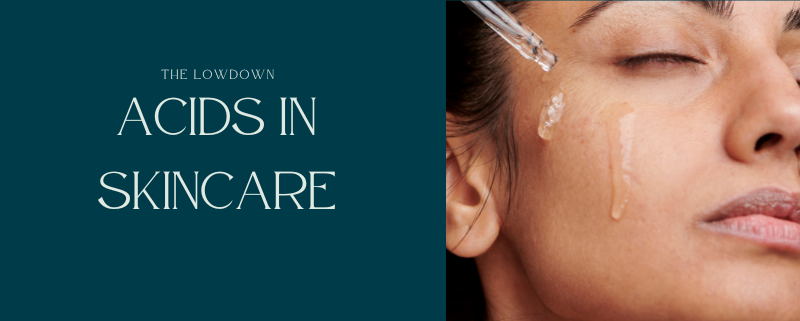The Lowdown on Acids in Skincare
Skincare is a vast and constantly evolving field, with new products and ingredients being introduced all the time. One group of ingredients that has gained a lot of attention in recent years is acids. But what exactly are these acids and how do they work in skincare products? In this article, we will explore the various types of acids used in skincare and their benefits and drawbacks.
What Are Acids in Skincare?
Acids are compounds that can donate or accept hydrogen ions. In skincare, these acids are typically used to exfoliate the skin, brighten the complexion, and improve the appearance of acne and other skin concerns. There are several different types of acids that are commonly used in skincare products, each with its own specific benefits and drawbacks.
Alpha Hydroxy Acids (AHAs)
Alpha hydroxy acids (AHAs) are a type of water-soluble acid that is commonly found in skincare products. AHAs are derived from fruit and milk sugars and are used to exfoliate the skin and improve the appearance of fine lines, uneven skin tone, and rough texture. AHAs work by breaking down the bonds between skin cells, allowing them to shed more easily and revealing smoother, brighter skin underneath. AHAs can be found in a variety of skincare products, including cleansers, toners, serums, and peels.
Some common AHAs found in skincare products include glycolic acid, which is derived from sugar cane, and lactic acid, which is derived from milk. Other AHAs include mandelic acid (derived from almonds) and malic acid (derived from apples).
AHAs can be beneficial for a variety of skin types, but they are particularly useful for those with dry or aging skin. However, AHAs can cause skin irritation and sensitivity, particularly if the product is used too frequently or if the skin is not properly protected with sunscreen. It is important to use AHAs as directed and to follow up with a sunscreen when using these products.
Beta Hydroxy Acids (BHAs)
Beta hydroxy acids (BHAs) are another type of exfoliating acid that is commonly found in skincare products. BHAs are oil-soluble, which means they can penetrate deep into the pores and help to unclog them. This makes BHAs particularly effective for those with oily or acne-prone skin. BHAs are also anti-inflammatory, making them helpful for reducing redness and swelling associated with acne.
Salicylic acid is the most common BHA found in skincare products. It is derived from willow bark and is often used in cleansers, toners, and spot treatments for acne.
Like AHAs, BHAs can cause skin irritation and sensitivity if used too frequently or without proper sunscreen protection. It is important to follow the directions on the product and to use a sunscreen when using BHAs.
Poly Hydroxy Acids (PHAs)
Poly hydroxy acids (PHAs) are a newer type of acid that is similar to AHAs in terms of their exfoliating properties. However, PHAs are larger in size and are not as penetrating as AHAs, making them less likely to cause irritation. This makes PHAs a good option for those with sensitive skin who may not be able to tolerate AHAs or BHAs.
Gluconolactone is a common PHA found in skincare products. It is derived from corn and is used in a variety of products, including cleansers, toners and serums. PHAs also have antioxidant and moisturising properties, making them helpful for those with dry or aging skin.
While PHAs are generally less irritating than AHAs or BHAs, it is still important to follow the directions on the product and to use a sunscreen when using PHAs to protect the skin.
Azelaic Acid
Azelaic acid is a natural acid that is found in grains like barley and wheat. It is used in skincare products to improve the appearance of acne, hyperpigmentation, and uneven skin tone. Azelaic acid works by inhibiting the production of excess melanin, the pigment that gives skin its color. It also has anti-inflammatory properties, making it helpful for reducing redness and swelling associated with acne.
Azelaic acid is generally well-tolerated by most skin types and is suitable for use on sensitive skin. It is often found in creams and serums and is usually applied topically to the skin.
Retinoids
Retinoids are a type of vitamin A derivative that is commonly used in skincare products to improve the appearance of acne, fine lines, and uneven skin tone. Retinoids work by increasing cell turnover, which helps to unclog pores and promote the production of collagen, a protein that gives skin its structure and elasticity.
Retinoids can be found in a variety of skincare products, including creams, serums, and peels. Some common retinoids found in skincare products include retinol, tretinoin, and adapalene.
Retinoids can be effective for a variety of skin concerns, but they can also cause skin irritation and sensitivity, particularly when first starting to use them. It is important to start with a lower concentration of retinoids and to gradually increase the frequency of use as the skin becomes more tolerant. It is also important to use a sunscreen when using retinoids, as they can make the skin more sensitive to the sun.
Final thoughts on Acids in Skincare
Acids are a powerful group of ingredients that are commonly used in skincare products to exfoliate the skin, improve the appearance of acne and other skin concerns, and brighten the complexion. There are several different types of acids, each with its own specific benefits and drawbacks. It is important to choose the right acid for your skin type and concerns and to use these products as directed to avoid irritation and sensitivity. In addition, it is always important to use a sunscreen when using acid-based skincare products to protect the skin from the sun’s harmful rays.






Leave a Comment/Share your Story
Want to join the discussion?